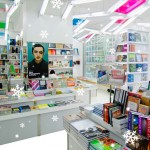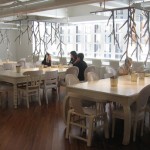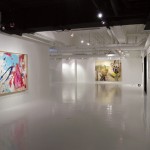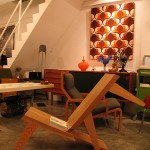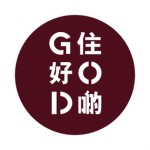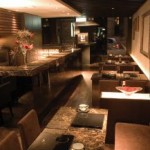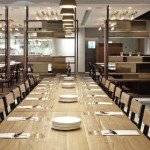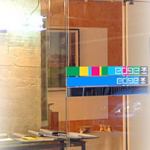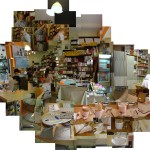アフタースクール・カフェAFTER SCHOOL CAFE
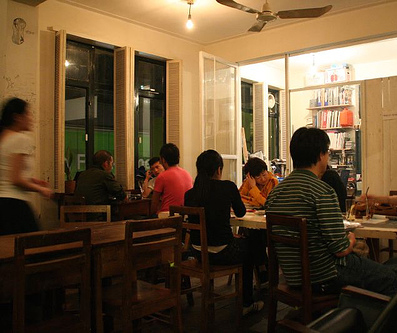
私たちは香港の銅羅湾地区にある隠れた宝石、アフタースクール・カフェからとても離れてなどいられない。数十人の誠実な友人とお客もまた、そうである。アフタースクール・カフェは100パーセントのカフェではないし、We just can’t keep away from Afterschool Cafe, a hidden gem in Hong Kongs’s Causeway Bay district. Neither can dozens of loyal friends and customers. Afterschool draws such a devoted base because it’s neither 100% cafe nor 100% workplace.100パーセントの仕事場でもないため、そのような愛好的な層を引き寄せるのである。アフタースクール・カフェの設立者であり、先見の明があったポキット・プーンは、あの晩にコーヒーを落とした男であり、そして深夜に来る人たちはどんな様子なのか、一部、一人で来る人はどんな風に悲しげなのか、そんな風に来る人たちがどのようにして彼をハッピーにさせるのか、を語る。
![]()
ポキットは、それをどのように名づけたか説明してくれた。『人が学校から卒業するとき、また仕事の世界に入るときというのは最も生き生きした夢であり、最も美しい瞬間なのです。自分の周囲を見渡すと、どれだけたくさんの人がこの瞬間を失ってきたかが見えます。私は友達に、それぞれの生活の中でこの活力を持ち続けていてほしいのです』。彼は慎重にメディアへの露出を避け、外の看板さえしない。というのも訪ねてくれる人の中である種のつながりを築きたいためである。
![]()
アフタースクール・カフェはポキットとアルバイトたちにより経営されている。『私は直感と実用性のバランスをとって経営をしています』と彼は言う。このカフェはまさしく、アートと実用の結合体であり、空間の極大化なのである。この小さな空間には座れる場所が広く取られていて、アンティークピアノがあり、バー・スペーズがついていて、プロ用のキッチンが備えつけられてあり、あの気品のあるトイレがあり、そしてポキットが日中仕事をする個人用のデザインスタジオがある。このスタジオはカフェより大きく、さらに実用的である。最近、アフタースクール・カフェはART IT誌の香港で唯一の設置店となった。彼はアジアにおける新しいアートに関するこの日本の雑誌のコンセプトに敬意を払っていて、彼の店のお客さんが近くの都市で何が起きているのかを読んで知り、プラスになれば、と思っている。『このカフェは共有する場所なのです。』
![]()
デザインのトレンドを調べている一方、彼は飲食店経営について学んでいる。香港ではカフェを開くことが簡単であるとはいうものの、維持するのは難しい。もの作りに伴うたくさんの困難は、その日の最初のお客さんが転がりこんで来るときまでにはきれいで洗練されたものになっている。ポキットは、そのことを実用的なコンセプトと目標、アート関連のコンセプトと目標の間での恒常的なバランスとして捉えている。一度に両方するのは難しいが、一方のためにもう一方を妥協するのはより一層難しい。彼は最初、実用的な計画を滑らかに行うことを考え、それから可能であろう現実の作業により焦点を合わせる。
![]()
このアートと実用性の間のバランスの大部分は、ポキットが香港のアーティストをどのように眺めるかに反映されている。こちらのアーティストはお金になる仕事をしなければならないため、アートまでカバーするのは難しいのである。『ここではたくさんの人がハートを持っています。しかし彼らは時間がないだけなのです』と彼は言う。彼は、このことによって、多くのアーティストがより協力的な環境がある他の都市へ移ってしまったと指摘している。『私は、人々がやりたいことはやらなければならない。どこにいようと。と信じています』と彼は加えた。
![]()
ポキットと彼の友達はこの空間に自身の哲学を反映させてきた。テーブルのうち一つはビルからアフタースクール・カフェへとつながるドアであり、同時に壁を飾る古い門である。このカフェにある全てのものが、発見されたものかサルベージされたものである。『毎年、銅羅湾における変化は恐ろしく早いのです』と彼は説明する。『この二年間で、下に入っている全ての店が変わりました。全ては投げ捨てられます。しかし私は、一部のものは通りや埋め立て地に置き去りにされるには惜しいと思います。だからカフェにそれらを持って帰るのです。』
![]()
インテリアデザインに関するバックグラウンドとフォトジャーナリストになるという夢とともに、ポキットは世界を変えたいのである。彼は言う。『ハートの根っこには、機能性が最も美しいというのがあります。それで、それだけです。』彼は、彼の空間にあるものがよく構成されていること、そして長くもつことを期待する。それは香港における使い捨て製品の急速な消費に対する嘆きである。『私はアーティストではありません。ただ本物が好きなのです』と彼は言う。
![]()
彼が取り組んでいる一つ確かなことはアフタースクール・カフェのアルバム作りである。彼はそれがビジネスに関して食事をしている人、ビジネスに専念している人のバックグラウンドであってほしくはない。『我々はものの内実を尊重しなければなりません。』アフタースクール・カフェは人々に感銘を与えるものをいかに作り出すか、に関して出来たものであるため、彼は友達に生活しているうちで最も印象的な音楽を選ぶよう頼んだ。そして、彼らはそのアルバムのために、アフタースクールカフェでこれらの曲を演奏し、録音するだろう。一部の人は、友達から寄付されたアンティークピアノを使用することさえあるかもしれない。『どれほどピアノの音が狂っていようと、私たちはそれが本当だから使うのです。』彼はつけ加えた。
![]()
彼はこう締めくくる。『私は人々が何を考えているのか知りたい。そしてパワー、エネルギー、アイデアを共有してくれる人をもっと引き合わせたい。この空間を維持するのは簡単ではない、そしていつのかなくなってしまうでしょう。しかしこの空間のエネルギーがなくなることはありません。私たちは旅の道中にある人々にそれを広めなければなりません。みんなそれが必要なのです。』
![]()
AFTER SCHOOL CAFE
住所:2/F, 17 Yun Ping Road, Causeway Bay, Hong Kong
時間:12:00〜25:00
TEL:+852 2983 2130
http://www.flickr.com/photos/afterschool/
![]()
Text: Kat Lo
Translation: Yuhei Kikuchi
Pokit Poon, the founder and visionary behind Afterschool, the man who shook the coffee that night, talks about how people come in the middle of the night, how some of them come alone to be sad, and how it makes him happy that they come like this.
![]()
Pokit explains how he named it: “When one graduates from school, and enters the world of work, this is the most energetic dream, the most beautiful moment. Around me, I can see how many people around me have lost this moment. I want my friends to hold onto this energy in their lives.” He deliberately avoids media exposure or even a sign outside, because he wants to build a sense of connection among its visitors.
![]()
Afterschool is run by Pokit and a cluster of part-time staff. “I do it with a balance of instinct and practicality,” he says. The cafe is truly a union of art and function, a maximization of space. The small space holds a large seating area, an antique piano, a bar, a professionally equipped kitchen, that sublime bathroom, and a private design studio, where Pokit works during the day. It is even bigger and more functional than this. Afterschool recently became one of ART IT’s only Hong Kong distributors. He respects the concept behind this Japanese magazine about new art in Asia, and hopes that his customers will benefit from reading about what’s happening in nearby cities. “The cafe is a space to share.”
![]()
While learning about design trends, he’s also learned about managing a food and beverage business. While it is easy to open a cafe in Hong Kong, it is hard to maintain. A lot of hard work goes into making things seem clean and fine by the time the first customers of the day roll in. Pokit sees it as a constant balance between the practical and art-related concept and goals. It’s difficult to do both at once, but even harder to compromise one for the other. He is first looking to make the practical operation smooth, and then focus more on the real work that will then be possible.
![]()
So much of this balance between art and practicality is reflected in how Pokit sees artists in Hong Kong. Because artists here have to have a job that pays the bills too, it’s hard to support art. “Many people here have heart, but they just don’t have the time,” he says. He notes that this has caused many artists to move to other cities with a more supportive environment. “I believe that people have to make happen what they want to happen, no matter where they are,” he adds.
![]()
What Pokit and his friends have done with this space reflects his own philosophy. One of the tables is an door from the building that houses Afterschool, as is an old gate that decorates the wall. Everything in the cafe is found or salvaged. “Every year, the changes in Causeway Bay are horribly fast,” Pokit describes. In two years, all the shops downstairs have changed. Everything is thrown away. But I think some things are too nice to be left for the street or landfill. So I brought them back to the cafe.”
![]()
With a background in interior design and a dream of being a photojournalist, Pokit wanted to change the world. He says, “The root of heart is that function is most beautiful. Then that is enough.” He expects the things in his space to be built well, and to last a long time, an idea a far cry from Hong Kong’s rapid consumption of disposable products. “I am not an artist,” he says, “but I like the real things.”
![]()
One real thing he is working on is making an Afterschool album. He doesn’t want it to be background to people eating or going about their business: “We must respect the inside of things.” Since Afterschool is about how to make things that inspire people, he asked friends to select the most inspiring music in their lives. They will then perform and record these songs at Afterschool for the album. Some people might even use the antique piano donated by a friend. “No matter how out-of-tune the piano is, we use it because it’s truthful,” Pokit adds.
![]()
He concludes, “I want to know what people think and would like to bring together more people who can share their power, energy, ideas. It’s not easy to maintain this space, and it might one day be lost. But the energy of this place cannot disappear. We have to spread it out to people for their journeys. We all need it.”
![]()
AFTER SCHOOL CAFE
Address: 2/F, 17 Yun Ping Road, Causeway Bay, Hong Kong
Opening Hours: 12:00-25:00
Tel: +852 2983 2130
http://www.flickr.com/photos/afterschool/
![]()
Text: Kat Lo
![]()
AFTER SCHOOL CAFE
地址:香港铜锣湾恩平道17号2楼
开放时间:12:00-25:00
电话:+852 2983 2130
http://www.flickr.com/photos/afterschool/
